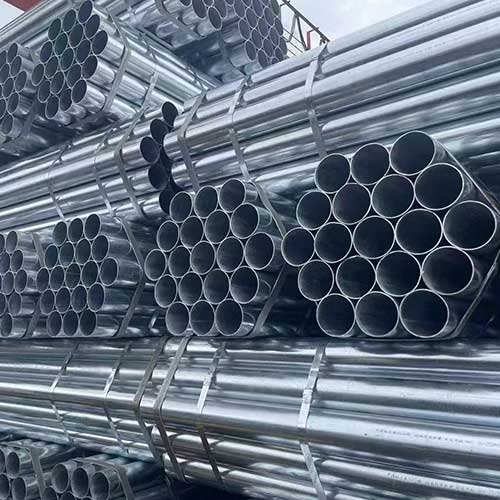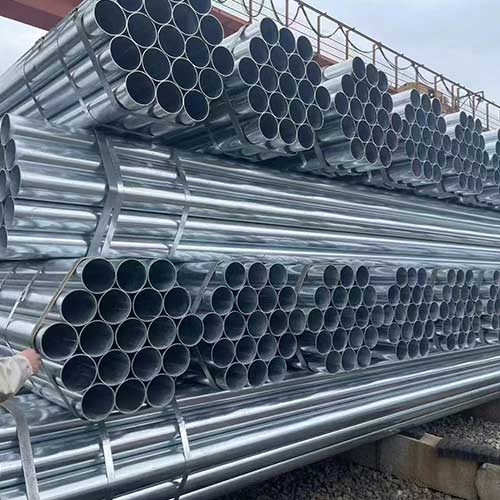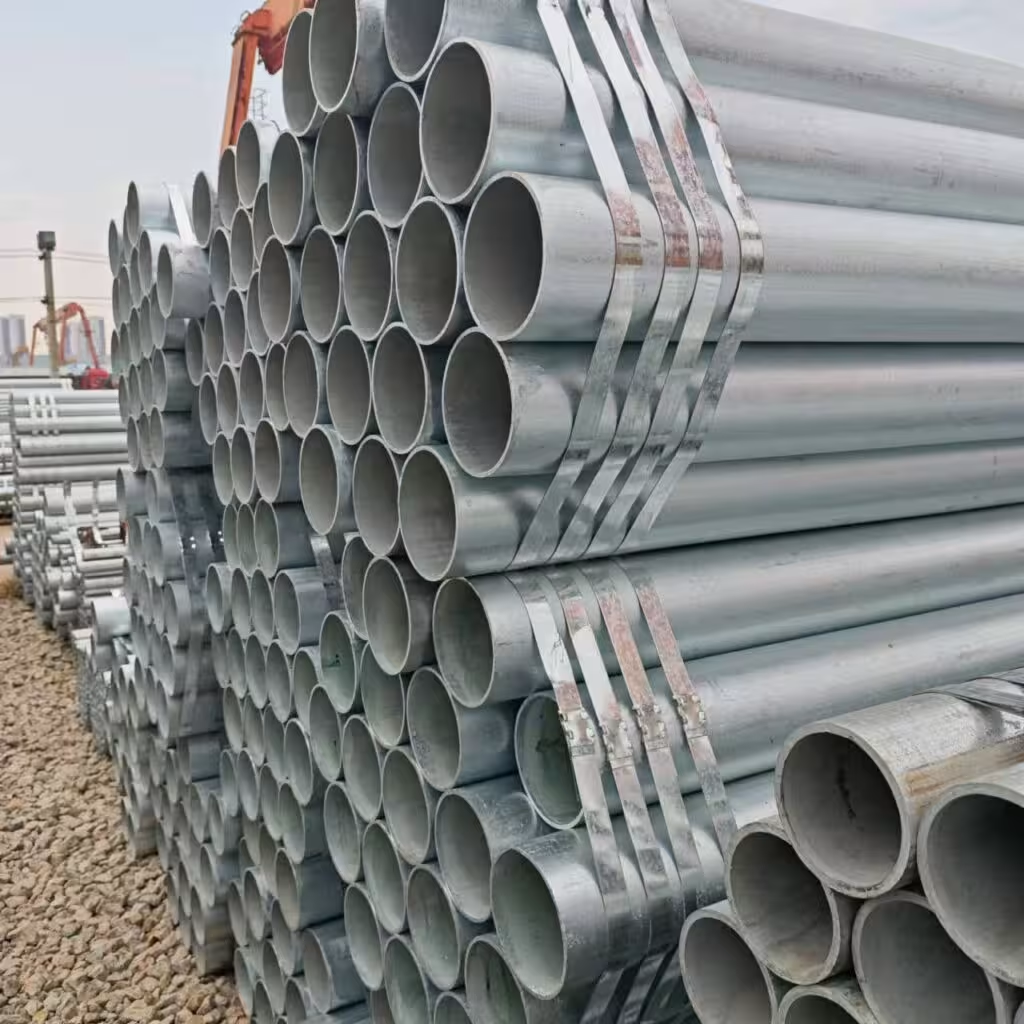مرحبًا بك في مدونتي!
قبل أن نتعمق في المحتوى، أود أن تنضموا إليّ على منصات التواصل الاجتماعي الخاصة بي حيث أشارك المزيد من الأفكار وأتفاعل مع المجتمع وأنشر التحديثات. إليك كيف يمكنك التواصل معي:
فيسبوك : فيسبوكhttps://www.facebook.com/profile.php?id=61565500692293
والآن، لنبدأ رحلتنا معًا. آمل أن تجدوا المحتوى هنا ثاقباً وجذاباً وقيّماً.
جدول المحتويات
ما هي الأنابيب المجلفنة؟
A الأنابيب المجلفنة is a type of steel pipe that has been coated with a layer of zinc to protect it from corrosion and rust. The process of coating the pipe with zinc is known as galvanization, which helps extend the pipe’s lifespan and ensures it remains durable in harsh environments. Zinc acts as a protective barrier that prevents moisture from coming into contact with the steel, which is a common cause of corrosion.
Galvanized pipes are widely used in plumbing, water systems, and even in construction for structural purposes. The coating provides resistance against corrosion, which makes them a reliable and cost-effective choice in many applications.

How Are Galvanized Pipes Made?
The process of making a galvanized pipe involves dipping steel pipes into a bath of molten zinc. This process, known as hot-dip galvanizing, ensures that the zinc bonds securely to the surface of the steel. The zinc coating forms a protective layer that shields the underlying steel from corrosion and rust.
There is another method known as electro-galvanizing, which involves using electricity to apply a thin layer of zinc to the steel surface. While both methods provide corrosion protection, hot-dip galvanizing offers a thicker and more durable coating.
The Galvanizing Process:
- الجلفنة بالغمس الساخن: The steel pipe is immersed in molten zinc, forming a thick protective layer.
- الجلفنة الكهربائية: Zinc is applied to the steel using an electrochemical process.
The galvanized coating not only protects the pipe but also enhances its strength and durability. It’s particularly useful in environments that experience moisture or exposure to various elements, which could otherwise lead to rusting in regular steel pipes.
Benefits of Using Galvanized Pipes
There are several advantages of galvanized pipes that make them a popular choice for various industries. Here’s a breakdown of the key benefits:
مقاومة التآكل
The primary advantage of a galvanized pipe is its corrosion resistance. The zinc coating forms a barrier that prevents moisture from reaching the steel, significantly reducing the chances of rust and deterioration over time. This makes galvanized pipes an excellent option for outdoor plumbing, irrigation systems, and marine applications.
عمر طويل
Galvanized pipes are known for their durability and long lifespan. In fact, they can last for several decades—sometimes up to 50 years or more—depending on the environment and how well they are maintained. This makes them a great long-term investment in both residential and commercial plumbing systems.
فعالة من حيث التكلفة
Compared to other corrosion-resistant materials, galvanized pipes are relatively affordable. The hot-dip galvanizing process is also cost-effective, making galvanized pipes a popular choice for large-scale plumbing installations. They offer excellent value for money while providing a high level of protection against corrosion.
Strong and Durable
In addition to corrosion resistance, galvanized pipes are also strong and durable. The steel provides structural strength, making these pipes suitable for high-pressure applications and heavy-duty use.

Common Applications of Galvanized Pipes
Galvanized pipes are used in a wide range of applications, thanks to their durability, strength, and corrosion resistance. Some of the most common uses include:
أنظمة السباكة
Galvanized pipes were commonly used in residential plumbing systems, particularly in homes built before the 1960s. These pipes are still found in many older homes, although they are increasingly being replaced with newer materials like PEX, CPVC, and copper. Galvanized pipes are primarily used for carrying water into and out of buildings.
Water and Gas Systems
Galvanized steel pipes are used in some water distribution systems and gas lines. The corrosion resistance of galvanized steel ensures that the pipes can endure the pressure of flowing water and gas without degrading over time.
Industrial and Structural Uses
Apart from plumbing, galvanized steel pipes are also used in structural applications, including scaffolding, fencing, and building frameworks. Their corrosion resistance and strength make them suitable for outdoor or exposed applications.
أنظمة الري
In agriculture, galvanized pipes are commonly used in irrigation systems due to their ability to withstand outdoor elements and the flow of water over long distances. Their durability in wet conditions makes them ideal for agricultural use.
How to Maintain Galvanized Pipes for Longevity
Even though galvanized pipes are designed to last a long time, proper maintenance is still important to ensure their longevity. Here are some tips to maintain your galvanized pipes:
عمليات التفتيش المنتظمة
Inspect the pipes regularly for any signs of wear and tear, including rust or corrosion. Although galvanized pipes are resistant to corrosion, they are not immune to it, especially if the zinc coating has been damaged.
تجنب المواد الكيميائية القاسية
When cleaning galvanized pipes, avoid using harsh chemicals that could damage the protective zinc coating. Instead, use mild detergents and water to clean the surface.
Proper Installation
Proper installation is crucial for ensuring the effectiveness of galvanized pipes. Ensure that pipes are securely connected and that there are no loose fittings that could lead to leaks or water damage.
What Are the Drawbacks of Galvanized Pipes?
While galvanized pipes have numerous benefits, they are not without drawbacks. Here are some of the key challenges associated with using galvanized pipes:
Lead Contamination Risk
Older galvanized pipes, especially those installed before the 1960s, may contain lead. Over time, the zinc coating on these pipes can degrade, allowing the lead to leach into the water supply, which can pose health risks. This is one of the main reasons why galvanized pipes are being replaced in modern plumbing systems.
Limited Flexibility
While galvanized pipes are strong and durable, they can be difficult to work with due to their rigidity. This makes them harder to install or modify compared to more flexible materials like PEX or copper.
Weight and Difficulty in Handling
Galvanized pipes are heavier than plastic or copper alternatives, which can make handling and installation more challenging. Their weight can also add to transportation and labor costs.

Table: Galvanized Pipe vs. Other Pipe Materials
| الميزة | الأنابيب المجلفنة | أنابيب النحاس | الأنابيب البلاستيكية |
|---|---|---|---|
| مقاومة التآكل | Excellent (zinc coating) | Excellent (naturally resistant) | Poor (susceptible to UV and chemicals) |
| العمر الافتراضي | 40-50 سنة | أكثر من 50 عامًا | 20-40 years |
| التكلفة | بأسعار معقولة | باهظة الثمن | Low cost |
| الوزن | ثقيل | متوسط | خفيف |
| المرونة | منخفضة | معتدل | عالية |
الخاتمة
Galvanized pipes have been a popular material for plumbing and other applications for decades due to their durability, strength, and cost-effectiveness. Whether used for plumbing, irrigation, or structural purposes, galvanized pipes provide excellent corrosion resistance and a long service life.
If you’re considering galvanized pipes for your next project, Jiuyang Steel can provide high-quality galvanized steel pipes tailored to your needs. Reach out to Jiuyang Steel today to learn more about our products and how they can benefit your project.
الأسئلة الشائعة
What is the main benefit of galvanized pipes?
The primary benefit of galvanized pipes is their corrosion resistance, which helps them last longer in harsh environments compared to non-coated steel pipes.
Are galvanized pipes still used in modern plumbing?
While galvanized pipes were common in older plumbing systems, they are being replaced by materials like PEX, CPVC, and copper due to concerns about lead contamination and other limitations.
كم من الوقت تدوم الأنابيب المجلفنة؟
Galvanized pipes typically last 40-50 years, depending on the environment and maintenance, though their lifespan can be shortened if exposed to aggressive conditions or poor maintenance.
Can galvanized pipes be replaced easily?
Replacing galvanized pipes can be more challenging due to their rigidity and weight. It’s essential to consult a professional plumber when replacing old galvanized piping.
How should I maintain galvanized pipes?
Regularly inspect galvanized pipes for signs of corrosion or damage. Avoid using harsh chemicals during cleaning and ensure proper installation for optimal performance.

